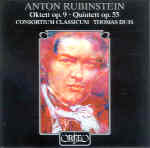Of the two Anton Rubinstein chamber works featured on this disc, I find the Op. 9 Octet from his student years more interesting and original than his mature Piano Quintet. In the Octet, Rubinstein takes full sonorous and skillful advantage of the flute, clarinet, horn, violin, viola, cello, double bass, and piano, notably in the effervescent, scampering second-movement Vivace (it often recalls the second movement of Saint-Saëns’ Second Piano Concerto). Still, the piano usually occupies center stage and bears most of the music’s virtuosic burden (try the finale’s octaves and double notes for size, or the first movement’s evocations of Beethoven’s “Tempest” Sonata).
This also applies to the tuneful yet relatively episodic and foursquare Piano Quintet. Pianist Thomas Duis and his colleagues turn in a vital, decisive, and tonally robust reading of the latter that on every level surpasses a 1979 recording by Felicia Blumenthal and the New Philharmonia Wind Ensemble. They make an equally compelling case for the Octet, and clearly revel in its muscle-flexing instrumental hurdles. For ardent seekers of Romantic chamber rarities, this well engineered release has the field to itself. [4/7/2005]
































